

This is so even compared with other countries of a similar size. Although we are one of the safest states in the world, why do we have the second-highest road fatality rate worldwide?
In this resource center, we will be taking a look at how our traffic police could further promote road safety to ensure that our roads are safe. We will be looking into the method of Operant Conditioning (a method focusing on reinforcement and punishment) and discover how this could transform our society into a safer one.
References:
. What is Operant Conditioning?
A breakdown of Operant Conditioning.
If you're on this page, you're probably doing some research on B.F.
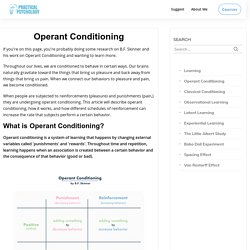
Skinner and his work on Operant Conditioning and wanting to learn more. Throughout our lives, we are conditioned to behave in certain ways. Our brains naturally gravitate toward the things that bring us pleasure and back away from things that bring us pain. When we connect our behaviors to pleasure and pain, we become conditioned. When people are subjected to reinforcements (pleasure) and punishments (pain,) they are undergoing operant conditioning. Operant conditioning is a system of learning that happens by changing external variables called 'punishments' and 'rewards'. Based on how the pigeons understood the consequences of their actions, and changes to their behavior, Skinner developed the idea of operant conditioning.
We can unearth the definition of operant conditioning by breaking it down. Here’s a quick example. In operant conditioning, you can change two variables to achieve two goals. Reinforcement in relevance: Reinforcement's effectiveness as a form of motivation: If you’ve ever seen a James Bond-style action film, you know the basic story line.

An evil genius is planning world domination, from his secret lair, high in the mountains, deep under the ocean or orbiting in space. He is busy perfecting the technology that will let him achieve his dastardly goal. Only the hero of the movie can stop him – usually, with mere seconds to spare. One constant feature of these films is the presence of minions. The Schedules of Reinforcement:
A Summary of the Schedules in Reinforcement: The purpose of Punishment: Punishment's effectiveness: Punishment is a term used in operant conditioning to refer to any change that occurs after a behavior that reduces the likelihood that that behavior will occur again in the future.
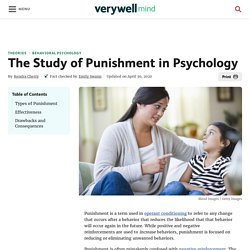
While positive and negative reinforcements are used to increase behaviors, punishment is focused on reducing or eliminating unwanted behaviors. Punishment is often mistakenly confused with negative reinforcement. The difference: Reinforcement increases the chances that a behavior will occur and punishment decreases the chances that a behavior will occur. Types of Punishment Behaviorist B. Traffic Police looking at incentives instead of deterrents for safer driving, Singapore News. Traffic Police in Singapore: A change on methods: Past campaigns to raise awareness: RoadSense Carnival On 6 July 2019, Traffic Police organised the RoadSense Carnival at the Ngee Ann City Civic Plaza.
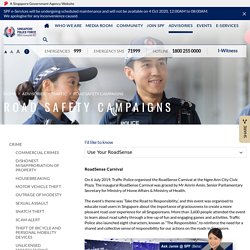
The inaugural RoadSense Carnival was graced by Mr Amrin Amin, Senior Parliamentary Secretary for Ministry of Home Affairs & Ministry of Health. The event’s theme was ‘Take the Road to Responsibility’, and this event was organised to educate road users in Singapore about the importance of graciousness to create a more pleasant road user experience for all Singaporeans. 2020 Online Campaign launch due to COVID-19: The Singapore Road Safety Council (SRSC) and Traffic Police (TP), with support from the Land Transport Authority (LTA), Ministry of Education (MOE), People’s Association (PA) and Automobile Association of Singapore (AAS), launched the Singapore Road Safety Month (SRSM) 2020 online campaign today.
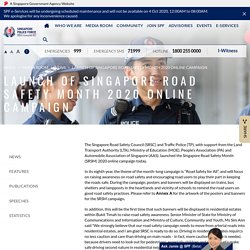
In its eighth year, the theme of the month-long campaign is “Road Safety for All”, and will focus on raising awareness on road safety and encouraging road users to play their part in keeping the roads safe. During the campaign, posters and banners will be displayed on trains, bus shelters and lampposts in the heartlands and vicinity of schools to remind the road users on good road safety practices.
Please refer to Annex A for the artwork of the posters and banners for the SRSM campaign. Road Safety Tips for Everyone: A safe road journey cannot be taken for granted!
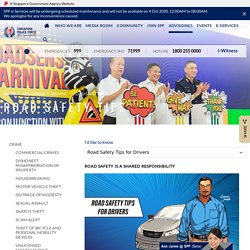
Like Gracious Joseph, remember to always exercise patience and graciousness. Stay alert, drive carefully and follow traffic rules, signs, and signals. Follow these safe-driving tips and habits to enhance your experience on the roads, and make your journeys more safe and pleasant. Never drink and drive. Never get behind the wheel when you’re tired. Maintain your vehicle regularly to minimise the chances of an accident due to mechanical failure. Always check your blind spot – avoid changing lanes at bends. Road Safety Tips: Certificate of Merit: A Fixed Interval of Positive Reinforcement:
Getting a driver’s licence ensures that you are qualified to drive.
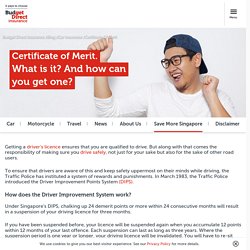
But along with that comes the responsibility of making sure you drive safely, not just for your sake but also for the sake of other road users. To ensure that drivers are aware of this and keep safety uppermost on their minds while driving, the Traffic Police has instituted a system of rewards and punishments. In March 1983, the Traffic Police introduced the Driver Improvement Points System (DIPS). How does the Driver Improvement System work? Singapore Road Safety Award, another form of Positive Reinforcement: Singapore Road Safety Award 2016 The Singapore Road Safety Council (SRSC) introduced the Road Safety Award in 2013 to recognize the efforts of companies and individuals who have contributed to a safer road in Singapore.
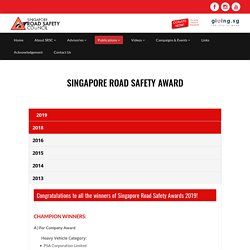
This year, the SRSC will be presenting the “Singapore Road Safety Awards 2016” in the final quarter of 2017. There will be 5 categories of awards, namely: Road Safety Award for Companies with Heavy Goods Vehicle Fleet Road Safety Award for Companies with Bus Fleet Road Safety Award for Companies with Motorcycle Fleet Road Safety Award for Safe Vocational Driver/Motorcyclist Road Safety Award for Most Improved Vocational Driver/ Motorcyclist The SRSC has increased the award categories over the years. This year, we have added the safe and the most improved vocational motorcyclist award under category D and E respectively. The two award categories are Safe Driver/Motorcyclist and Most Improved Driver/Motorcyclist.
Spot Good Motorist Campaign, an example of Posivie Reinforcement with a Variable Ratio: SINGAPORE, Jan. 2, 2019 /PRNewswire/ -- A first-half of 2018 results released by the General Insurance Association of Singapore (GIA) found an 11.8% increase in incurred car insurance claims, totalling S$291.3 million for the interim period, despite fewer reported accidents.
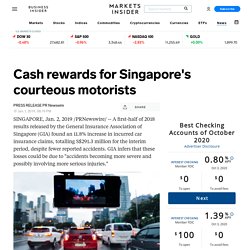
GIA infers that these losses could be due to "accidents becoming more severe and possibly involving more serious injuries. " Budget Direct Insurance gives cash rewards to Singapore's courteous motorists Meanwhile, a recent study by independent consumer research firm ValueChampion has revealed that latest road traffic accident figures do show that reckless driving is still a real cause for concern, possibly accounting for more than half of recorded accidents in 2017.* Budget Direct Insurance says it aims to help tackle the issue of reckless driving with a "Spot Good Motorists" campaign to encourage good driving behaviour.
But now the insurer is turning its spotlight on safe, courteous drivers and motorcyclists. Photo - Penalties for Reckless Driving in Singapore, a form of Positive and Negative Punishment: Perhaps you’re a fan of the Fast & Furious film franchise and want to try out those cool car stunts for yourself.
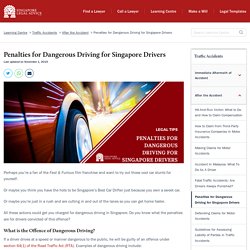
Or maybe you think you have the hots to be Singapore’s Best Car Drifter just because you own a sweet car. Traffic Offenses that could lead to revocation of your driving lisence, a form of Negative Punishment: The number of traffic offences committed in Singapore have been constantly high. In 2016, 4,532 traffic violations were recorded, with more people caught breaking traffic laws in the first 9 months of 2016, almost triple that of the same period in 2015. Traffic rules are strictly enforced and violations often come with severe penalties to deter drivers from driving irresponsibly. In this article, we address some commonly asked questions about road traffic offences in Singapore and explain what you should do in the event you are charged with committing one.
What are Some Common Traffic Offences? A Guide on Traffic Offenses and how to avoid them, another form of Negative Punishment: As we settle back into Phase 1 of the circuit breaker lifting measures, more drivers have begun to return to the roads. Under the Driver Improvement Points System (DIPS), there are several traffic offences in Singapore that can land you demerit points or even a composition fine. A composition fine refers to the exchange of monetary payment in order to avoid prosecution in the court of law.
In Singapore, traffic offense fines may be determined by the weight of your vehicle. Light vehicles are classified as having an unladen weight of 2500 kg and below, while vehicles that exceed that weight are classed as heavy vehicles. Tax Reduction, Rebates or Re-evaluation: Cyclist Policies: